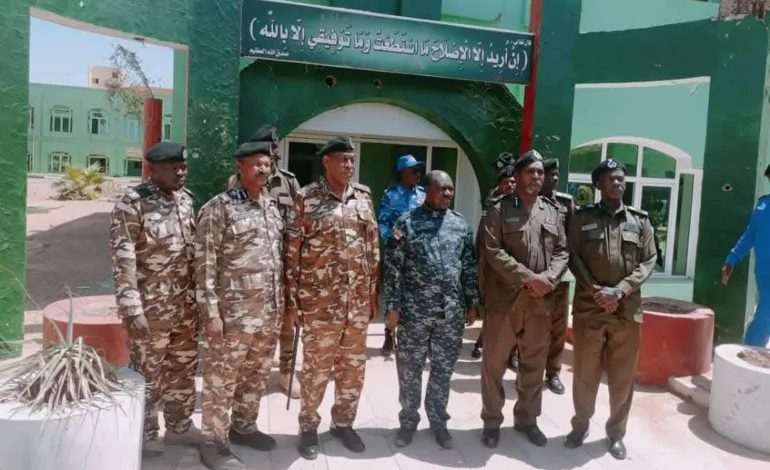Released by the Militia… Sudanese Efforts to Reapprehend Thousands of Prisoners

Report by Fath Al-Rahman Shubarka
Sudan’s Minister of Interior, Khalil Basha Sayreen, told Al Jazeera Net that the number of “inmates” released from prisons by the Rapid Support Forces (RSF) since the outbreak of the war on April 15, 2023, has exceeded 19,000.
The minister explained that the inmates from prisons in war-affected states—Khartoum, Al-Jazira, Sennar, and Darfur—were freed by the RSF and did not escape voluntarily.
He added that the identities of these individuals are recorded with the General Directorate of Prisons and that they have been added to travel ban lists to prevent them from leaving Sudan through official airports and border crossings. However, he did not rule out the possibility that some may have fled through Sudan’s vast and porous land borders.
Basha noted that there are five prisons in Khartoum State, varying in their condition depending on the extent of destruction and vandalism. He confirmed that the current status of prisons in Khartoum is reassuring and will help restore the justice system to its proper function.
Prisoners and Prison Conditions
The interior minister further stated that most of the inmates released from prisons have joined the RSF, and that some were originally RSF members convicted of various crimes. For instance, Al-Huda prison alone held over 300 RSF members.
He noted that some of these former inmates voluntarily returned to prison, while a few others were recaptured by police investigations. However, the majority remain at large.
He announced that legal procedures for voluntary return would soon be publicized. Those who do not comply will have their names widely disseminated through media and search operations to facilitate their arrest in safe and liberated areas.
Basha emphasized that all administrative and criminal procedures will be activated to reapprehend them, including cooperation with Interpol offices in neighboring countries to help return those who fled abroad.
He said damage to Al-Huda, Soba, and Dabbak prisons in Khartoum State was not extensive, and operations have resumed. Soba and Dabbak prisons have been designated for detained RSF members and their collaborators, while Al-Huda has been allocated for regular inmates and convicts from Khartoum and overcrowded prisons in other states.
As for Kober Prison, it suffered heavy damage and needs renovation. Omdurman Prison, however, has been repaired since the city’s liberation and currently houses about 600 inmates.
In recent days, the prison administration completed its return to its headquarters in Al-Mogran, Khartoum, following improved security after the army regained control of the capital. It confirmed its readiness to secure all prisons and begin maintenance and restoration across Khartoum’s prison facilities.
Several officials also visited the capital’s prisons to assess their readiness to receive either fugitive or new inmates. During his visit to Khartoum State last April, Sudan’s Chief Justice, Maulana Abdel Aziz Fath Al-Rahman, pledged to coordinate with relevant authorities to reopen prisons and restore the judicial system. Meanwhile, Sudan’s Attorney General, Fateh Tayfour, welcomed the resumption of operations in Khartoum’s prisons.
A Prisoner’s Testimony
Al Jazeera Net spoke to a convict in a neighboring country, who had been sentenced for a criminal case in central Sudan. He said that after escaping prison, he unfortunately got involved in another crime by cooperating with the RSF, before eventually fleeing the RSF-controlled area and leaving the country through illegal smuggling routes.
The man, who gave the pseudonym “Amir,” asserted he never intended to escape but was “forced into it” after the RSF stormed Al-Huda prison, which was abandoned by its guards and inmates. He claimed that the crimes he personally witnessed being committed by the militia surpassed anything he had seen among seasoned criminals during his more than three years in prison.
Amir left open the possibility of returning to Sudan to surrender and serve the remainder of his sentence. He said he is torn between returning or remaining in hiding outside Sudan. “Both options are painful,” he said.
One of the Worst Outcomes of War
On the possibility of returning escaped convicts from abroad, Sudanese crime journalist Tareq Abdullah told Al Jazeera Net that Interpol would be used, though he cautioned that this might fail if the fugitives reached unstable countries. He said most escapees fled to three countries: Libya, Chad, and South Sudan.
Abdullah described the mass release of inmates and convicts as one of the war’s worst consequences, as it compromised victims’ rights and freed thousands of murderers, rapists, and individuals convicted in terrorism-related cases. He noted that in cases involving private rights, victims are trying to gather information about the perpetrators.
He warned that the release of dangerous gangs from prison, now armed and organized, poses a growing security threat. This, coupled with the police force’s decline due to loss of personnel and equipment, could further deteriorate public safety.
Abdullah, who was once detained by the RSF in Soba Prison, confirmed that most of the escapees—especially those from RSF-aligned communities—have joined the militia. Some have since died or been captured, while others, like Ali Rizgallah “Savanna,” are still fighting. He recently led a failed RSF attack on the town of An-Nuhud in West Kordofan, according to Abdullah.



